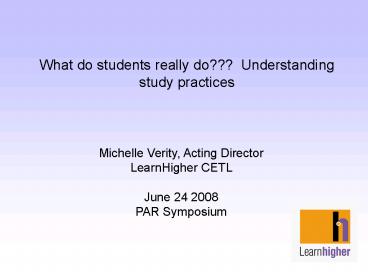Michelle Verity, Acting Director LearnHigher CETL - PowerPoint PPT Presentation
1 / 15
Title:
Michelle Verity, Acting Director LearnHigher CETL
Description:
Social practice perspective on TLA ... Misinterpretation & distortion. Tutor owned ... Social practices of students and staff. Staff expectations. Support ... – PowerPoint PPT presentation
Number of Views:49
Avg rating:3.0/5.0
Title: Michelle Verity, Acting Director LearnHigher CETL
1
What do students really do??? Understanding
study practices
Michelle Verity, Acting Director LearnHigher
CETL June 24 2008 PAR Symposium
2
- 16 partner universities
- Committed to improving student learning
- Providing excellent resources that support
students learning development - Through practice led enquiry that builds a
research base to inform the effective use of
these resources
3
LearnHigher Research Aims
- To understand the learning development of our
students their practices, what hinders them and
how we can better support it - In particular, how resources can be used
effectively to support the process
4
Social practice perspective on TLA
Rejects the rational-cognitive model (individual,
private, context independent) Views learning as
an interplay between individuals and their
environments (Knight et al., 2006) Knowledgeabi
lity and expertise are not simply inside our
individual heads but are intimately tied to
various aspects of the relationships we have with
people, technologies and other dimensions of
context (Lave, 1988)
5
Activity Theory
Engeström, 1987
6
Questions
- What aspects identified in the activity system
could be said to support effective study
practices and what tensions are identified that
could hinder success? - How far does Activity Systems Theory help us to
make sense of students study habits?
7
The present study
- 22 undergraduates
- Interviews rich pictures
- Hermeneutical interpretive data analysis
8
TOOLS AND SIGNS Course handbooks and
booklists Previous assignments Virtual Learning
Environment Library resources Electronic
resources (university based) Internet/
Google Computers Writing Centre
SUBJECT Student undertaking an assignment
OBJECT Achieving a good assignment grade
OUTCOMES
RULES Subject discourse/ conventions Departmental
rules Assignment deadlines Tutor preferences/
expectations
DIVISION OF LABOUR Tutor/student power
relations Student sharing of references, reading
and notemaking
COMMUNITY Students on same course Other
students Family (support) Library
staff Department staff/ Tutors
9
- What was the nature of the mediating artefacts
and signs? - How did they support or undermine study
practices? - Module handbooks booklists
- The library books
- Electronic resources
10
- What was the nature of the stated and tacit rules
that were operative in the community? - How did these support or undermine study
practices? - Activity directed
- Misinterpretation distortion
- Tutor owned
11
- How was the division of labour manifested in the
community? - Did the division of labour support or undermine
the development of effective study practices? - Peers, family, library staff, IT support,
Learning Developers - Tutor power
12
Limitations
- Issues of agency
- Location within the nodes
- Description not prediction
13
Conclusions
- Study practices are structured by mediating
artefacts, rules and division of labour within
the university community. - Successful utilisation of handbooks, booklists,
library, books, electronic journals, e-books,
internet, support services - Grasp subject conventions, department rules,
tutor expectations - Tensions existing within the community shape
study practices - Scarce resources/ access issues
- Peers as a source of support/ propel
misinformation - Tutors as valuable mediating artefact/ power
relations
14
Future research?
- Exploring students use of tools in supporting
their learning development - Social practices of students and staff
- Staff expectations
- Support/ independent learning paradox
15
- Thank you!

